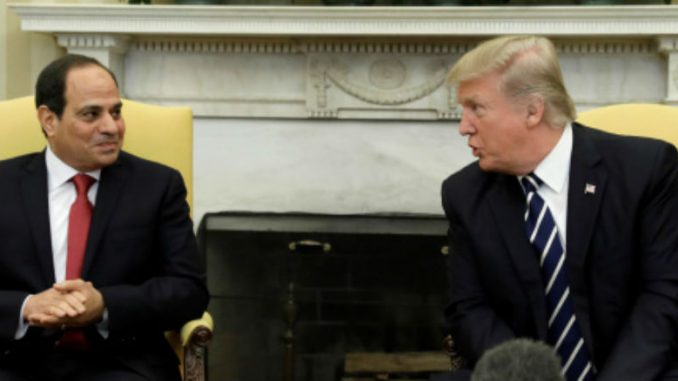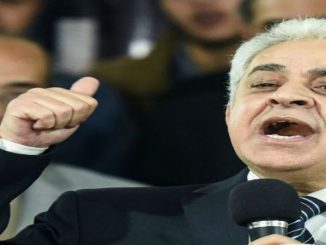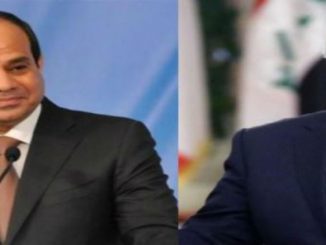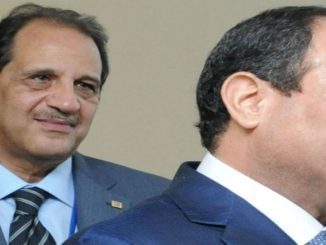
Seeking to strengthen relations with one of U.S. most traditional pivotal Middle Eastern allies, President Donald Trump told his Egyptian counterpart that U.S. support for his country is unwavering.
Trump said,”You have a great friend and ally in the United States and in me.”
Trump also said as he sat beside al-Sisi in the Oval Office,”We agree on so many things.” He added, “I just want to let everybody know in case there was any doubt that we are very much behind al-Sisi. He’s done a fantastic job in a very difficult situation. We are very much behind Egypt and the people of Egypt. The United States has, believe me, backing, and we have strong backing.”
U.S. and Egypt soared under the former administration of Barack Obama, which admonished Cairo for its rights abuses following the military overthrow of Egypt’s first democratically elected President Mohammed Morsi.
In 2013,U.S. suspended military aid to Egypt before resuming it two years later, but Obama never extended an invitation to the Egypt’s military dictator after he assumed office in 2014 amid continued human rights violations.
Moreover, during Obama administration, “The State Department’s human rights report accuses Sisi’s government of stifling basic freedoms and enforcing its repression through torture, the disappearances of critics, and arbitrary arrests and killings.”
However, Trump’s flattering words to Egypt’s al-Sisi during his first official visit to the United Sates of America are considered a sharp shift from Obama Administration.
Tens of thousands of people now languish in jail, and American citizens number among the many swept up by al-Sisi’s police state. They include all sorts of opposition dissidents, human rights advocates and liberals, not just Islamists.
Sarah Margon, the Washington director of Human Rights Watch, in a statement, “Inviting Sisi for an official visit to Washington as tens of thousands of Egyptians rot in jail, and when torture is again the order of the day is a strange way to build a stable strategic relationship.”
Enabling Egypt’s Bloody Dictator
In fact, whether Trump intends it or not, Sisi will interpret these statements as a green light to do whatever he likes, and he will assume (correctly) that he need not worry about any interference from Washington over the next four years.
There is no doubt that Trump’s statement that he and Sisi “agree on so many things” will be taken as license by the Egyptian government to arrest, torture, and kill their domestic critics with impunity.
The New York Times in its article titled:”Enabling Egypt’s President Sisi, an Enemy of Human Rights” wrote,”American presidents must sometimes deal with unsavory foreign leaders in pursuit of America’s national interest. But that doesn’t require inviting them to the White House and lavishing them with praise and promises of unconditional support.”
It also stated that what President Trump did is not just welcoming “but celebrating one of the most authoritarian leaders in the Middle East, Abdel Fattah Al-Sisi of Egypt, a man responsible for killing hundreds of Egyptians, jailing thousands of others and, in the process, running his country and its reputation into the ground.”
Accordingly, it is now crystal clear that human rights and democracy are not his big concerns to U.S. news President and that he places more value on Egypt as a partner in the fight against the Islamic State.
The White House said, prior to al-Sisi’s visit, that it would no longer allow human rights issues to become a public point of conflict with Egypt, which was described by the New York Times as “another striking shift away from years of American foreign policy.”
Although Trump noted the United States and Egypt “have a few things” they do not agree on, he made no public airing of US concerns about human rights in Egypt.
The White House said, prior to al-Sisi’s visit, that it would no longer allow human rights issues to become a public point of conflict with Egypt.
In the same context, a White House statement praised al-Sisi for waging a vigorous war against terrorists and making efforts to strengthen Egypt’s economy, while also making no mention of his crackdown on domestic opponents.
It said, “Al Sisi has taken a number of bold steps since becoming president in 2014, including calling for the reform and moderation of Islamic discourse and initiating courageous and historic economic reforms.”
The White House written statement said also that terrorism posed a major threat to Egypt’s stability. It said,”The United States is fully committed to helping Egypt take the necessary steps to defeat Sinai-based terrorist groups.”
Will U.S Support to Al-Sisi Bring Stability in the Region?
Al- Sisi’s repression against enemies real and imagined, his management of the economy and inability to train, educate and create jobs for his nation’s youth can only fuel more anger and unrest, according to the New York Times.
It added,”What he does not grasp is that,while Egypt is an important country, it cannot be a force for regional stability nor the partner Mr. Trump imagines on counter terrorism or anything else if Mr. Sisi does not radically change his ways.”
In the same context, Amr Hamzawy, a senior associate in the Middle East program at the Carnegie Endowment for International Peace, said in his article titled:”How Sisi is destabilizing Egypt” that,”Since 2013, Egypt’s new authoritarianism has exacerbated societal divisions by systematically propagating alternative facts.”
He added,”The labeling of opponents as enemies, terrorists, and violent actors has stirred up vengeful sentiments among wide segments of the population, which have come to demand measures of collective immediate punishment for the Muslim Brotherhood, like-minded Islamist movements, human rights activists, and liberal pro-democracy groups.”
“The government has propagated these alternative facts without paying attention to the dangerous repercussions they are bound to have on Egypt’s societal fabric, without appreciating their negative impacts on notions of justice and the rule of law, without realizing the correlations between all this and making Egypt truly unstable,”said Hamzawy.
In addition, al-Sisi’s approach to counter-terrorism has made things worse, not better. The crackdown on the Muslim Brotherhood, an Islamist organization that is committed to pursue its goals through electoral means, fueled a low-grade insurgency pitting jihadists in Egypt’s strategic Sinai Peninsula against government security forces.
Al-Sisi began cracking down first on the Muslim Brotherhood’s supporters after the military coup in 2013.
When pro-Morsi demonstrators staged a peaceful sit-in in Cairo’s Rabaa al-Adawiya Square on August 14, 2013, to protest Morsi’s ouster, Sisi’s military forces gunned them down and more than 1000 in a single day, and more than 40,000 people are jailed in a crackdown.
In the same context, a report from the German Council on Foreign Relations explained that “After the crackdown in Rabaa Square, there was a significant change in the insurgency’s rhetoric, behavior, intensity, and scale of operations, as well as in its overall narrative and goals.”
The report quotes one jihadist leader in Sinai linking this directly to Sisi’s repression,”After what happened after the military coup, fighting the armed forces became an urgent necessity,” the leader said.
In 2014, the Sinai jihadists swore allegiance to ISIS. Since then, Sinai militants has led excessive campaign against the Egyptian security forces. Sisi’s repressive response, which has included evicting thousands of families suspected of supporting the jihadists from their homes, has failed to contain and curb the insurgency.
Moreover, the number of terrorist in Egypt between (2014-2016) reached 1,165, according to Al-Ahram Center for Political and Strategic Studies.
In the last quarter of 2016, 104 terrorist operations took place across the country. And on October 31, 2015, a Russian passenger airliner, Metrojet Flight 9268, was brought down over north Sinai following its departure from the resort town of Sharm el-Sheikh, killing 213.
ISIS-linked militants in the Sinai, known as Sinai Province, claimed their responsibility.
In addition, al-Sisi has actually strengthened jihadists narrative.
Jihadists have argued that violence was the only way to topple the Middle East dictators.
As a result, when al-Sisi launched his military takeover of the country, ousted Morsi, and proceeded to crack down hard on dissent of all kind — Islamist or otherwise — it was a bitter “we told you so”, will say the jihadists.
They would also say,”You have to listen to us as ballot boxes have no use and what we have been saying all along that all these people understand is violence.”
Accordingly, by supporting doubling down on US support for Sisi, Trump is neither combating terrorism nor fighting the ideology of radical Islamic terrorism, but he is mainly making the ideology even more powerful.
Furthermore, the new administration unconditional support to al-Sisi will be used to encourage more hostility against U.S.



